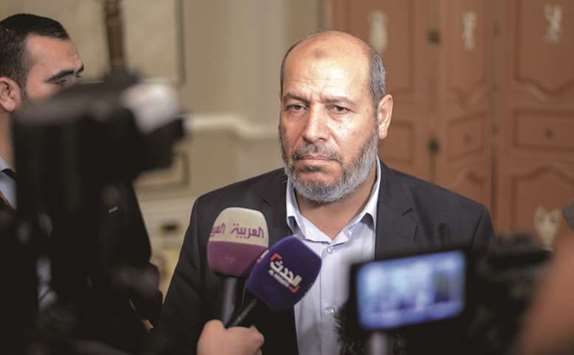Palestinian leaders yesterday left the Egyptian capital Cairo after fresh unity talks that resulted in calls for elections but provided little clarity about a key transfer of power in Gaza next week.
Analysts said a three-page document agreed between the 13 largest Palestinian political parties on Wednesday offered little substantive change, with no steps agreed on key points of difference.
They said questions would now be raised over the fate of an Egyptian-brokered reconciliation agreement signed last month between the two largest parties, Hamas and Fatah.
Under that deal, Islamists Hamas are supposed to hand over power in the Gaza Strip to the Fatah-dominated Palestinian Authority by December 1.
Significant issues remain, however, including the future of Hamas’s armed wing and punitive measures taken by Palestinian President Mahmoud Abbas against Gaza.
Wednesday’s statement provided few further details, though it called for Abbas to organise elections by the end of 2018 and backed the October 12 Fatah-Hamas agreement.
Hamas has controlled Gaza since seizing the coastal enclave from Fatah in 2007, and its armed wing has since fought three wars with Israel.
In a sign of dissatisfaction, a senior Hamas figure who was in Cairo said Wednesday the talks had resulted in “no practical steps” forward.
In a video published online, Salah Bardawil said Israel and the United States had put pressure on Fatah not to implement reconciliation, and it was therefore unwilling to make concessions to Hamas.
Israel and the United States have declared they will not accept a Palestinian unity government including Hamas unless it disarms.
“American pressure”, Bardawil said, led to a “statement that is not clear and has no practical steps”.
He later backtracked, claiming he was emotional and was not aware he was being filmed when he spoke.
Measures taken by Abbas to isolate Hamas in recent months, including reducing the subsidy for electricity supplied to Gaza, have also been sources of contention.
Sources within the delegations said Fatah was pressed to drop the sanctions as an indication of good will, but it refused.
After the talks, the leftist Popular Front for the Liberation of Palestine said in a statement that the failure to remove the measures “reflects the lack of political will to achieve reconciliation”. Analysts expressed concern that hopes for unity were fading.
“They didn’t solve a single issue, even the simplest,” said Najee Sharab, professor of political affairs at Azhar University in Gaza.
“The statement by Bardawil, despite his retreating from it, is a strong signal of disagreement.”
Several previous reconciliation attempts have failed in the past decade.
“During the last round (of discussions), they raised hopes but there has been no progress in this round,” said Ghassan Khatib, a former Palestinian Authority minister.
Wednesday’s statement called on Abbas to organise new elections by the end of 2018.
Hamas won the last parliamentary poll in 2006 but the results were rejected by Israel, the United States and other members of the international community.
A year later, following violent infighting, Hamas forced Fatah out of Gaza.
Since then, Israel has maintained a crippling blockade of the strip, which it says is necessary to isolate Hamas but critics say amounts to collective punishment.
Palestinian and international leaders hope implementation of the unity deal could help ease the hardships of Gaza’s 2mn residents, who suffer from severe poverty and unemployment.
UN special coordinator for the Middle East peace process, Nickolay Mladenov, told the UN Security Council on Monday that, despite the challenges, the reconciliation “must not be allowed to fail”.
“If it does, it will most likely result in another devastating conflict,” he said.
Hamas has already handed control of the borders with Israel and Egypt to the Palestinian Authority, but December 1 is supposed to see it cede full control in the strip.
Hamas leaders have repeatedly insisted the group will not give up its weapons.
Jihad Harb, a political analyst based in the occupied West Bank, said he expected Fatah and Hamas to hold a meeting on December 1, but little practical change on the ground.
“I do not believe anything substantial towards ending the Palestinian division will happen in early December,” he said.

Hamas senior political leader Khalil al-Hayya speaks during a press conference at the end of two days of closed-door talks attended by representatives of 13 leading political parties held in the Egyptian capital Cairo on Wednesday night.
